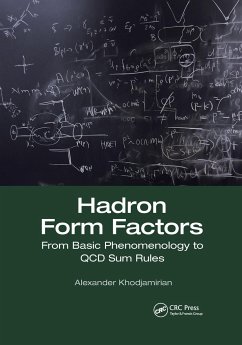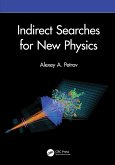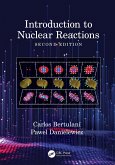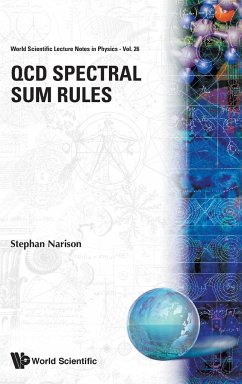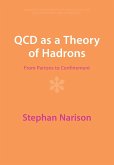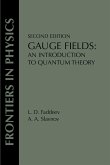This book introduces the phenomenology and theory of hadron form factors in a consistent manner, deriving step-by-step the key equations, defining the form factors from the matrix elements of hadronic transitions and deriving their symmetry relations. Explained are several general concepts of particle theory and phenomenology exemplified by hadron form factors. The main emphasis here is on learning the analytical methods in particle phenomenology. Many examples of hadronic processes involving form factors are considered, from the pion electromagnetic scattering to heavy B-meson decays. In the second part of the book, modern techniques of the form factor calculation, based on the method of sum rules in the theory of strong interactions, quantum chromodynamics, are introduced in an accessible manner.
This book will be a useful guide for graduate students and early-career researchers working in the field of particle phenomenology and experiments.
Features:
- The first book to address the phenomenology of hadron form factors at a pedagogical level in one coherent volume
- Contains up-to-date descriptions of the most important form factors of the electroweak transitions investigated in particle physics experiments
This book will be a useful guide for graduate students and early-career researchers working in the field of particle phenomenology and experiments.
Features:
- The first book to address the phenomenology of hadron form factors at a pedagogical level in one coherent volume
- Contains up-to-date descriptions of the most important form factors of the electroweak transitions investigated in particle physics experiments
Form factors are certain functions that characterise distribution and flow of matter inside extended objects and are very common in particle and hadron physics. The book by A. Khodjamirian provides a general review of this broad topic at the level accessible for graduate students. The standard course in the theory of strong interactions, Quantum Chromodynamics, should be a prerequisite.
The book is addressed to students specialising in QCD phenomenology who want to familiarize themselves with the general concepts and learn how the calculations of hadron form factors are done in practice using several standard methods, without digging too much in the theory background. It will also be useful for experimenalists who are interested in an overall picture and want to understand where the theory predictions come from.
The last three chapters contain a somewhat more advanced material as compared to the rest of the book.
They will be very useful for practitioners as an introduction to the techniques of QCD sum rule calculations.
Prof. Dr. Vladimir Braun, Universität Regensburg
The reader interested in the hadronic phenomenology based on Quantum Chromodynamics (QCD) will find only a few books on the market, if at all.
Alexander Khodjamirian's book "Hadron Form Factors: From Basic Phenomenology to QCD Sum Rules" solves just that problem with regards to a particular aspect of phenomenology, namely the hadronic form factors. Alexander Khodjamirian covers this topic in a very consistent manner, from the beginning to the end. The book starts from a brief introduction which explains how form factors had appeared in atomic physics and then extends this notion to the hadronic form factors as they are known today, after 50 years of development of QCD. More exactly (and to avoid confusion), Alexander Khodjamirian focuses on analytic QCD, the area of his expertise. Chapter 1 presents a concise review of QCD, and introduces relevant notation and techniques. It also describes main phenomenological facts about relevant parameters and hadronic form factors {\em per se}. In Chapter 2 a long journey in the analytic QCD-based theory begins. As a remarkable feature of this book I should mention that the reader will find here a large number of various form factor problems - basically, all those playing a crucial role in understanding the hadronic phenomenology. It also explains {\em en route} the sum rule method, starting from the SVZ sum rules, through generalizations, to the light-cone sum rules most relevant in the form factor analyses. The book is pedagogically written, and I should add, quite masterfully. It will provide a great service to graduate students and young researchers in this area.
Mikhail Shifman, University of Minnesota
The book is addressed to students specialising in QCD phenomenology who want to familiarize themselves with the general concepts and learn how the calculations of hadron form factors are done in practice using several standard methods, without digging too much in the theory background. It will also be useful for experimenalists who are interested in an overall picture and want to understand where the theory predictions come from.
The last three chapters contain a somewhat more advanced material as compared to the rest of the book.
They will be very useful for practitioners as an introduction to the techniques of QCD sum rule calculations.
Prof. Dr. Vladimir Braun, Universität Regensburg
The reader interested in the hadronic phenomenology based on Quantum Chromodynamics (QCD) will find only a few books on the market, if at all.
Alexander Khodjamirian's book "Hadron Form Factors: From Basic Phenomenology to QCD Sum Rules" solves just that problem with regards to a particular aspect of phenomenology, namely the hadronic form factors. Alexander Khodjamirian covers this topic in a very consistent manner, from the beginning to the end. The book starts from a brief introduction which explains how form factors had appeared in atomic physics and then extends this notion to the hadronic form factors as they are known today, after 50 years of development of QCD. More exactly (and to avoid confusion), Alexander Khodjamirian focuses on analytic QCD, the area of his expertise. Chapter 1 presents a concise review of QCD, and introduces relevant notation and techniques. It also describes main phenomenological facts about relevant parameters and hadronic form factors {\em per se}. In Chapter 2 a long journey in the analytic QCD-based theory begins. As a remarkable feature of this book I should mention that the reader will find here a large number of various form factor problems - basically, all those playing a crucial role in understanding the hadronic phenomenology. It also explains {\em en route} the sum rule method, starting from the SVZ sum rules, through generalizations, to the light-cone sum rules most relevant in the form factor analyses. The book is pedagogically written, and I should add, quite masterfully. It will provide a great service to graduate students and young researchers in this area.
Mikhail Shifman, University of Minnesota

